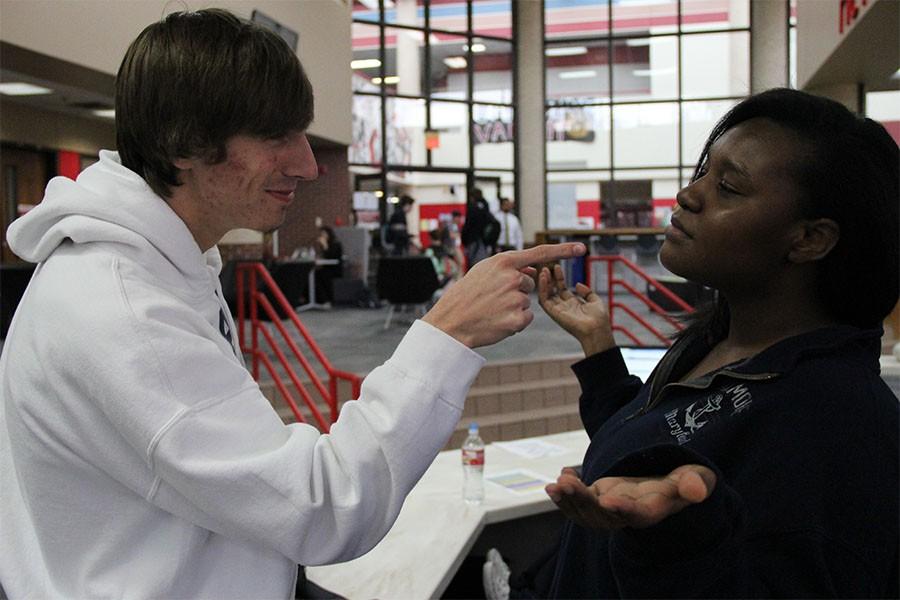Right to free speech does not mean right to offend
As a writer of the opinions section, I have learned a multitude of important details from fellow students on how to be a successful writer. The Sidekick prides itself on allowing its students to write about issues they feel are important and relevant to Coppell High School or the surrounding community, often times both.
It also pride itself on allowing students to share their ideas – whatever they may be – for new stories, photographs, edits and designs. However, along with all of the wonderful tips that I have picked up, I also noticed a slight trend in literary technique: the phrase “well, it’s just my opinion.”
You’re right. It is purely your opinion. There are also various forms of opinions, especially the kind that you say to people and the kind that you do not. For example, I personally have never liked salad. There are tons of people who do. My friend and co-writer Jamie Kimbrell, who sits next to me in class loves salad, and she just told me that she eats it almost everyday. That is so cool, but it is not for me. That is an opinion, and one that you can share with everyone.
One that is not so safe to share is if you were to say something harmful about someone else, such as “this person is horrible because…” Now, if you are commenting on someone negatively because they have done something negative, maybe they said something unnecessarily rude to a teacher, or maybe they make you do all of the work in a group project, then yeah. It is not the nicest thing to say, but it is still your opinion.
The opinions you truly should not share, and also maybe the ones that you should not have in the first place, are the ones that harm others based on stereotypes and contradicting moral values. I have read many columns and heard many conversations on how freedom of speech gives people the right to say what they want, and therefore the right to offend under the protection of United States law. That is far from the truth.
As any good writer would do, I did some effective research and found a list provided by the U.S. Court’s official website which provided specific details of what you are protected for within the United States in regards to the First Amendment.
- You have the right not to speak (specifically, the right not to salute the flag). This case was settled in West Virginia Board of Education v. Barnette, 319 U.S. 624 (1943).
- To use certain offensive words and phrases to convey political messages. This case was settled in Cohen v. California, 403 U.S. 15 (1971).
- To contribute money (under certain circumstances) to political campaigns. This case was settled in Buckley v. Valeo, 424 U.S. 1 (1976).
- To advertise commercial products and professional services (with some restrictions). This case was settled in Virginia Board of Pharmacy v. Virginia Consumer Council, 425 U.S. 748 (1976); Bates v. State Bar of Arizona, 433 U.S. 350 (1977).
- To engage in symbolic speech, (e.g., burning the flag in protest). This case was settled in Texas v. Johnson, 491 U.S. 397 (1989); United States v. Eichman, 496 U.S. 310 (1990).
These are all of the things that our federal courts outline as being protected under our Bill of Rights. Even if there isn’t a specific clause in our founding documents that says you shouldn’t spread harmful opinions, defending those opinions doesn’t make you look any better. A perfect example of this is the recent Irving mosque protests. Many have argued that the protestors had the right to freedom of speech and that they were therefore not violating any laws or causing any harm.
However, the protesters held signs that said, “Stop the Islamization of America” and “Solution to Islamic terrorism,” with an arrow pointing towards armed military service members. This protest was centered around ignorant Islamophobia that also disrupted the peace of those practicing their religion. Therefore, this protest not only violates the First Amendment, but it also violates the mosque member’s right to freedom of religion.
Now anyone could easily counter with the 2011 Supreme Court case Snyder vs. Phelps, in which speech held on a public sidewalk towards a public issue cannot be held liable for issues of emotional distress. The protesters were on a public sidewalk, yet there topic was not of a public issue. They were not protesting about any action of the U.S. Federal Government, which logically appeals to public topics. They were protesting about another group’s religion, which is considered a personal and/or private matter to those of their faith. This therefore trumps that argument.
As a reminder, the armed protesters released the addresses of those who were worshipping at the Mosque that day. The list has been taken down. Why would they need to post something like that? Possibly to invoke an indirect hate crime.
This leads back to my original resolution: If you have an opinion that seeks to harm another, one that is racist, homophobic, sexist, transphobic, etc., then your opinion first loses respect, then credibility, and later you lose your right to share that opinion. Freedom of speech does not mean you have the freedom to offend. And why would you want to argue over the right to offend someone anyway – it just makes that person look worse.
You could argue that your opinion is not intended to offend someone and that people should just get over it, but if the person it is directed at is offended and tells you why, then it is offensive. If you say something homophobic, and a homosexual individual tells you to not say it because it is homophobic, then you do not say it. If a person of color tells you that your opinion is racist, then it is. Granted, you may not know that you said something of offense, but rather than trying to defend your opinion, take the time to talk with them and find out what the issue was in the first place. Therefore once you’ve educated yourself on the issue, you can avoid the mistake in the future.
In regards to the balance of moral values in our contemporary context, if a person within a minority faces discrimination, they have the right to say what is and is not discriminating against them. Plus, you can not argue about who is and is not discriminatory when someone straight up says, “Stop the Islamization of America.” That is clearly a bigoted statement. Just because we celebrate the right to free speech, this does not give us the right to offend.

Grant Spicer is a Senior and second year staff writer for The Sidekick. Grant specializes in writing opinions articles and answering those difficult questions.



